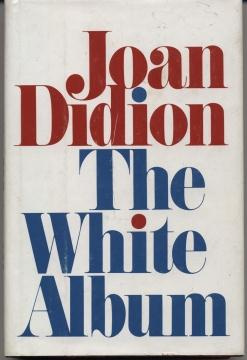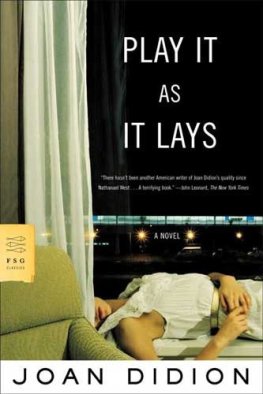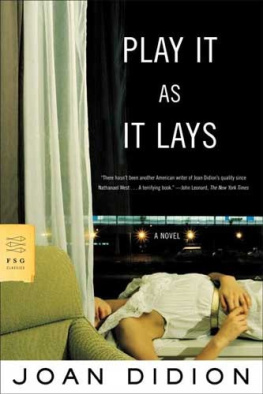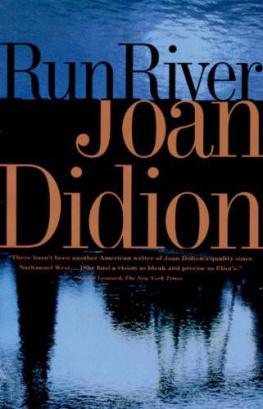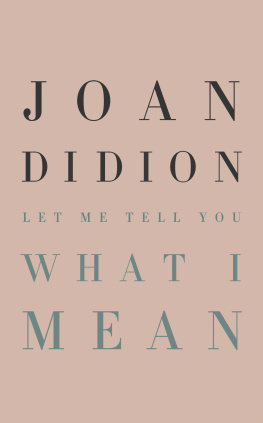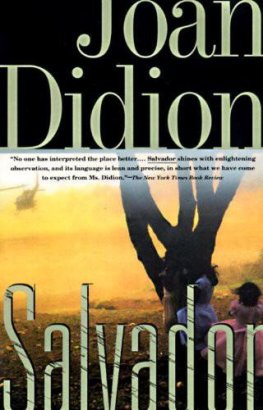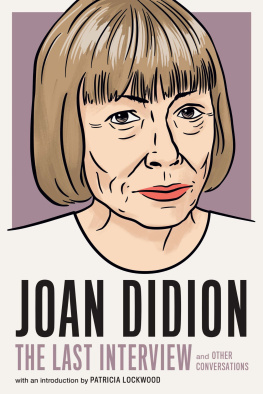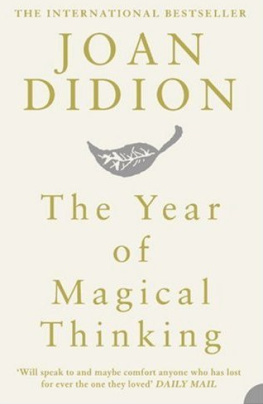Joan Didion - The Last Thing He Wanted
Here you can read online Joan Didion - The Last Thing He Wanted full text of the book (entire story) in english for free. Download pdf and epub, get meaning, cover and reviews about this ebook. year: 1997, publisher: Vintage, genre: Science fiction. Description of the work, (preface) as well as reviews are available. Best literature library LitArk.com created for fans of good reading and offers a wide selection of genres:
Romance novel
Science fiction
Adventure
Detective
Science
History
Home and family
Prose
Art
Politics
Computer
Non-fiction
Religion
Business
Children
Humor
Choose a favorite category and find really read worthwhile books. Enjoy immersion in the world of imagination, feel the emotions of the characters or learn something new for yourself, make an fascinating discovery.

- Book:The Last Thing He Wanted
- Author:
- Publisher:Vintage
- Genre:
- Year:1997
- Rating:5 / 5
- Favourites:Add to favourites
- Your mark:
- 100
- 1
- 2
- 3
- 4
- 5
The Last Thing He Wanted: summary, description and annotation
We offer to read an annotation, description, summary or preface (depends on what the author of the book "The Last Thing He Wanted" wrote himself). If you haven't found the necessary information about the book — write in the comments, we will try to find it.
The Last Thing He Wanted — read online for free the complete book (whole text) full work
Below is the text of the book, divided by pages. System saving the place of the last page read, allows you to conveniently read the book "The Last Thing He Wanted" online for free, without having to search again every time where you left off. Put a bookmark, and you can go to the page where you finished reading at any time.
Font size:
Interval:
Bookmark:
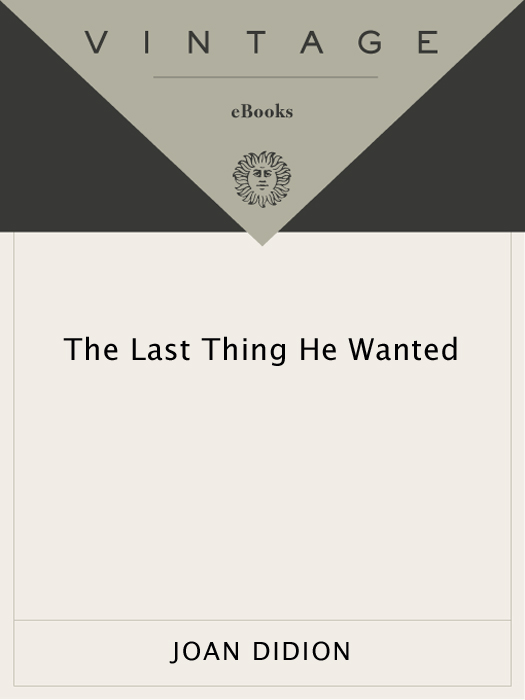
A moral thriller on the order of one of Graham Greenes.
Los Angeles Times
She is of that small group of great living writers whom readers can be said to love.
New York magazine
Stunning. It is a meditation on power and memory, on truth and consequences, and on the heartbreaking need for a magic equation that will make sense of our confusing world.
Seattle Post-Intelligencer
Even nonfans will have a hard time letting go of The Last Thing He Wanted until theyve raced through to the last page.
Newsweek
She writes taut and sharp. Her disquieting novels are short but never light. And they are all too few and far between.
St. Louis Post-Dispatch
The marvelous gifts of observation and rendering that make her nonfiction so telling and alive are working in this book.
Minneapolis Star Tribune
Didion is one of our true stylists. Her sentences have the precision of a Wodehouse or a Waugh.
Newsday
Joan Didion was born in California and lives in New York City. She is the author of five novels and seven previous books of nonfiction, including The Year of Magical Thinking. Her collected nonfiction, We Tell Ourselves Stories in Order to Live, was published by Everymans Library in September 2006.
B OOKS BY J OAN D IDION
W E T ELL O URSELVES S TORIES IN O RDER TO L IVE
T HE Y EAR OF M AGICAL T HINKING
W HERE I W AS F ROM
P OLITICAL F ICTIONS
T HE L AST T HING H E W ANTED
A FTER H ENRY
M IAMI
D EMOCRACY
S ALVADOR
T HE W HITE A LBUM
A B OOK OF C OMMON P RAYER
P LAY I T AS I T L AYS
S LOUCHING T OWARDS B ETHLEHEM
R UN R IVER
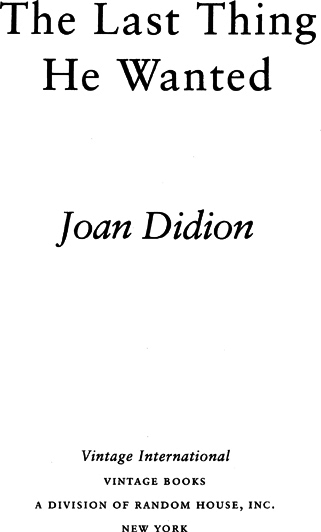
This book is for Quintana
and for John.
S ome real things have happened lately. For a while we felt rich and then we didnt. For a while we thought time was money, find the time and the money comes with it. Make money for example by flying the Concorde. Moving fast. Get the big suite, the multi-line telephones, get room service on one, get the valet on two, premium service, out by nine back by one. Download all data. Uplink Prague, get some conference calls going. Sell Allied Signal, buy Cypress Minerals, work the management plays. Plug into this news cycle, get the wires raw, nod out on the noise. Get me audio, someone was always saying in the nod where we were. Agence Presse is moving this story. Somewhere in the nod we were dropping cargo. Somewhere in the nod we were losing infrastructure, losing redundant systems, losing specific gravity. Weightlessness seemed at the time the safer mode. Weightlessness seemed at the time the mode in which we could beat both the clock and affect itself, but I see now that it was not. I see now that the clock was ticking. I see now that we were experiencing not weightlessness but what is interestingly described on page 1513 of the Merck Manual (Fifteenth Edition) as a sustained reactive depression, a bereavement reaction to the leaving of familiar environments. I see now that the environment we were leaving was that of feeling rich. I see now that there will be no Resolution Trust to do the workout on this particular default, but I did not see it then.
Not that I shouldnt have.
There were hints all along, clues we should have registered, processed, sifted for their application to the general condition. Try the day we noticed that the banks had called in the paper on all the malls, try the day we noticed that somebody had called in the paper on all the banks. Try the day we noticed that when we pressed 800 to do some business in Los Angeles or New York we were no longer talking to Los Angeles or New York but to Orlando or Tucson or Greensboro, North Carolina. Try the day we noticed (this will touch a nerve with frequent fliers) the new necessity for changes of equipment at Denver, Raleigh-Durham, St. Louis. Try, as long as we are changing equipment in St. Louis, the unfinished but already bankrupt Gateway Airport Tower there, its boutiques boarded up, its oyster bar shuttered, no more terry-cloth robes in the empty cabanas and no more amenity kits in the not quite terrazzo bathrooms: this should have alerted us, should have been processed, but we were moving fast. We were traveling light. We were younger. So was she.
F or the record this is me talking.
You know me, or think you do.
The not quite omniscient author.
No longer moving fast.
No longer traveling light.
When I resolved in 1994 to finally tell this story, register the clues I had missed ten years before, process the information before it vanished altogether, I considered reinventing myself as PAO at the embassy in question, a career foreign service officer operating under the USICA umbrella. Lilianne Owen was my name in that construct, a strategy I ultimately jettisoned as limiting, small-scale, an artifice to no point. She told me later, Lilianne Owen would have had to keep saying, and I learned this after the fact. As Lilianne Owen I was unconvincing even to myself. As Lilianne Owen I could not have told you half of what I knew.
I wanted to come at this straight.
I wanted to bring my own baggage and unpack it in front of you.
When I first heard this story there were elements that seemed to me questionable, details I did not trust. The facts of Elena McMahons life did not quite hang together. They lacked coherence. Logical connections were missing, cause and effect. I wanted the connections to materialize for you as they eventually did for me. The best story I ever told was a reef dream. This is something different.
The first time Treat Morrison ever saw Elena McMahon she was sitting alone in the coffee shop at the Intercon. He had flown down from Washington on the American that landed at ten a.m. and the embassy driver had dropped him at the Intercon to leave his bag and there was this American woman, he did not think a reporter (he knew most of the reporters who covered this part of the world, the reporters stayed close to where they believed the story was, that was the beauty of operating on an island where the story had not yet appeared on the screen), an American woman wearing a white dress and reading the classified page of the local paper and sitting alone at a round table set for eight. Something about this woman had bothered him. In the first place he did not know what she was doing there. He had known she was an American because he recognized in her voice when she spoke to a waiter the slight flat drawl of the American Southwest, but the American women left on the island were embassy or the very occasional reporter, and neither would be sitting at apparent loose ends in the Intercon coffee shop. In the second place this American woman was eating, very slowly and methodically, first a bite of one and then a bite of the other, a chocolate parfait and bacon. The chocolate parfait and bacon had definitely bothered him.
At the time Treat Morrison saw Elena McMahon eating the parfait and bacon in the coffee shop at the Intercon she had been staying not at the Intercon but out on the windward side of the island, in two adjoining rooms with an efficiency kitchen at a place called the Surfrider. When she first came to the Surfrider, in July of that summer, it had been as assistant manager, hired to be in charge of booking return flights and baby-sitters and day tours (the sugar mill plus the harbor plus the islands single Palladian Revival great house) for the young Canadian families who had until recently favored the place because it was cheap and because its Olympic-length pool was deeper at no point than three feet. She had been introduced to the manager of the Surfrider by the man who ran the car-rental agency at the Intercon. Experience in the travel industry was mandatory, the manager of the Surfrider had said, and she had faked it, faked the story and the supporting letters of reference about the three years as social director on the Swedish cruise ship later re-flagged (this was the inspired invention, the detail that rendered the references uncheckable) by Robert Vesco. At the time she was hired the island was still getting occasional misguided tourists, not rich tourists, not the kind who required villas with swimming pools and pink sand beaches and butlers and laundresses and multiple telephone lines and fax machines and instant access to Federal Express, but tourists nonetheless, mostly depressed young American couples with backpacks and retired day-trippers from the occasional cruise ship that still put in: those less acutely able to consider time so valuable that they would spend it only in the worlds most perfect places. After the first State Department advisory the cruise ships had stopped, and after the second and more urgent advisory a week later (which coincided with the baggage handlers strike and the withdrawal of two of the four international air carriers with routes to the island) even the backpackers had migrated to less demonstrably imperfect destinations. The Surfriders Olympic-length pool had been drained. Whatever need there had been for an assistant manager had contracted, then evaporated. Elena McMahon had pointed this out to the manager but he had reasonably suggested that since her rooms would be empty in any case she might just as well stay on, and she had. She liked the place empty. She liked the way the shutters had started losing their slats. She liked the low clouds, the glitter on the sea, the pervasive smell of mildew and bananas. She liked to walk up the road from the parking lot and hear the voices from the Pentecostal church there. She liked to stand on the beach in front of the hotel and know that there was no solid land between her and Africa. TourismRecolonialization by Any Other Name? was the wishful topic at the noon brown-bag AID symposium the day Treat Morrison arrived at the embassy.
Font size:
Interval:
Bookmark:
Similar books «The Last Thing He Wanted»
Look at similar books to The Last Thing He Wanted. We have selected literature similar in name and meaning in the hope of providing readers with more options to find new, interesting, not yet read works.
Discussion, reviews of the book The Last Thing He Wanted and just readers' own opinions. Leave your comments, write what you think about the work, its meaning or the main characters. Specify what exactly you liked and what you didn't like, and why you think so.


